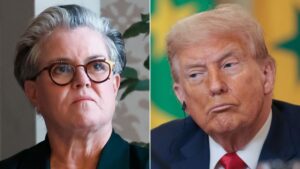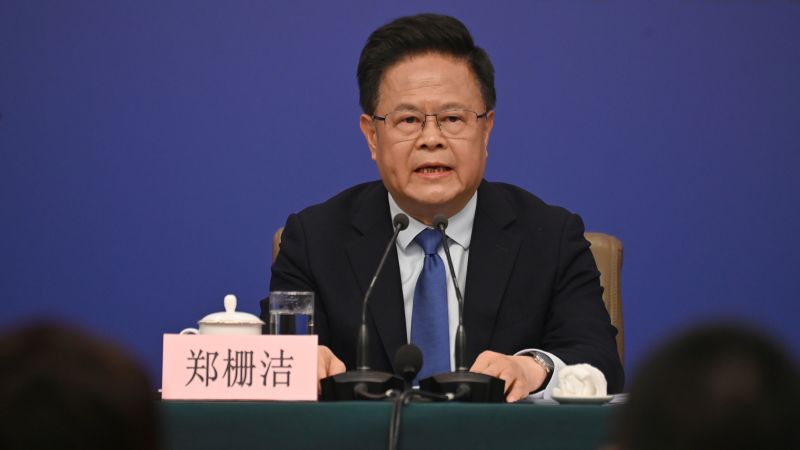In a significant move aimed at bolstering technological innovation, China’s chief economic officials announced the establishment of a state-supported fund following the global triumph of DeepSeek’s latest artificial intelligence (AI) reasoning model. The announcement was made by Zheng Shanjie, head of the National Development and Reform Commission, during a press conference at the annual gathering of China’s legislature and advisory body. This projected “state venture capital guidance fund” is intended to focus on groundbreaking areas such as artificial intelligence, quantum technology, and hydrogen energy storage to foster innovation.
The ambitious fund aims to accumulate nearly 1 trillion yuan (approximately $138 billion) over the course of two decades, with financial contributions anticipated from local governments as well as the private sector. Zheng highlighted that leaders within China regard advancements in crucial tech domains, particularly high-end chips, quantum computing, robotics, and AI, as vital to advancing the nation’s economic growth and upgrading manufacturing capabilities. However, China’s efforts are complicated by increasing technological restrictions imposed by the United States.
At the news conference, Zheng expressed a resilient attitude, celebrating the rapid evolution of China’s capacity in microchips, sophisticated AI language models, and a variety of industrial and humanoid robots. He pointed out that scenes once relegated to science fiction are now materializing thanks to the nation’s advancements in technology and creativity. In a pointed reference to the U.S., Zheng stressed that foreign efforts to suppress China’s technological progress merely fuel the nation’s determination for self-reliance and innovation.
DeepSeek, a private company, achieved notable success with its R1 large language model, which created a stir across global stock markets upon its launch in January. Remarkably, DeepSeek’s model could nearly rival the capabilities of established competitors, such as OpenAI’s GPT-4, Meta’s Llama, and Google’s Gemini, all while incurring significantly lower costs. This achievement is particularly surprising given that the United States had previously imposed stringent restrictions on the sale of powerful AI chips to China due to national security concerns. The implication is that DeepSeek’s model was developed using relatively less powerful chips, yet still managed to achieve impressive results.
On the legislative front, Chinese Premier Li Qiang stressed the significance of nurturing emerging industries and guiding future industries in his government’s annual work report. This includes creating mechanisms to enhance financial support for diverse fields like bio-manufacturing, quantum technology, embodied AI, and 6G technology. There is also a renewed commitment to strengthening domestic consumption among government officials, focusing on a range of economic tools to stimulate growth within the country.
With a backdrop of increased competition from global partners, China’s push to spur technological growth highlights its desire to build a more self-sufficient ecosystem. Last year, the Chinese economy largely depended on exports, which led to a trade surplus nearing $1 trillion, drawing criticism from U.S. President Donald Trump, who responded by increasing import tariffs on Chinese goods. Furthermore, China’s household consumption was reported at a mere 39% of its GDP in 2023, compared to significantly higher rates in other developed nations, indicating a potential area for policy enhancement.
The ongoing political discussions have prompted China to elevate its budget deficit targets to approximately 4% of GDP, signaling a robust approach to counteract external pressures such as U.S. tariffs. Additionally, Premier Li indicated that the government plans to issue government bonds totaling 6.2 trillion yuan ($855 billion), primarily split between central and local authorities, to support infrastructure investments and mitigate the impact of economic slowdowns.
As part of the broader strategic approach, authorities are expected to launch consumer subsidy initiatives, which may include a “cash-for-clunkers” program targeting vehicles and electronics. The overarching success of these initiatives will rely heavily on reinvigorating private entrepreneurs, who play a crucial role in driving technological progress and fostering innovation amidst stringent regulations.
Finally, during a recent conference, President Xi Jinping encouraged leading tech executives to harness their capabilities, emphasizing that the time is ripe for private enterprises to fully engage in innovation. China’s private sector plays a pivotal role in the economy, contributing over 60% to the GDP and accounting for more than 80% of employment, despite being outmatched in size by the state sector.
Upcoming deliberations regarding the Private Economy Promotion Law aim to provide essential protections and support for the private sector, further instilling confidence among businesses recovering from regulatory crackdowns. Overall, these developments highlight China’s ambition to cultivate an innovative economy, adapt to foreign pressures, and stimulate domestic consumption as pathways toward rejuvenating its economic landscape.











